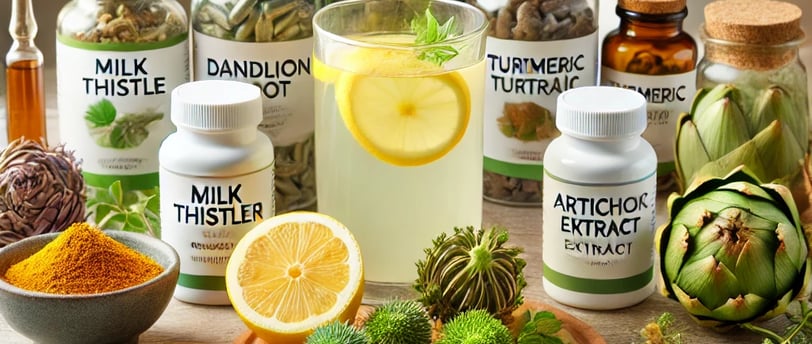Top Detox Supplements to Support Liver Health
The liver is a vital organ responsible for detoxifying the body, metabolizing nutrients, and supporting overall health. To maintain optimal liver function, certain supplements can be beneficial. Below is an outline of key supplements known to support liver health.
Ifsha Mudasir
1/27/20253 min read


Introduction
The liver serves as the body's primary detoxification center, filtering toxins, metabolizing nutrients, and supporting various physiological processes. Maintaining liver health is crucial for overall well-being. Incorporating specific detox supplements can aid in supporting liver function and promoting detoxification.
Milk Thistle (Silybum marianum)
Milk thistle is renowned for its liver-protective properties, primarily due to its active compound, silymarin. Silymarin has been shown to stabilize cell membranes and stimulate protein synthesis, aiding in the regeneration of liver tissue. It also exhibits antioxidant effects, reducing oxidative stress within the liver.
Turmeric (Curcuma longa)
Turmeric contains curcumin, a compound with potent anti-inflammatory and antioxidant properties. Curcumin has been found to modulate inflammatory pathways and enhance the activity of detoxifying enzymes in the liver. Its ability to scavenge free radicals further supports liver health.
N-Acetyl Cysteine (NAC)
NAC is a precursor to glutathione, one of the body's most important antioxidants. By increasing glutathione levels, NAC enhances the liver's capacity to neutralize toxins and protect against oxidative damage. It also supports the detoxification of heavy metals and environmental pollutants.
Dandelion Root (Taraxacum officinale)
Traditionally used in herbal medicine, dandelion root acts as a diuretic, promoting the elimination of toxins through urine. It also stimulates bile production, facilitating digestion and the removal of waste products from the liver.
Artichoke Leaf (Cynara scolymus)
Artichoke leaf extract contains cynarin, which has been shown to increase bile production and support liver function. It also exhibits antioxidant properties, protecting liver cells from damage and aiding in the regeneration of liver tissue.
Glutathione
Glutathione is often referred to as the "master antioxidant" due to its central role in detoxification processes. It directly neutralizes free radicals and reactive oxygen species, reducing oxidative stress in the liver. Glutathione also conjugates with toxins, making them more water-soluble and easier to excrete.
Alpha-Lipoic Acid (ALA)
ALA is a versatile antioxidant that functions in both water and fat-soluble environments. It regenerates other antioxidants, such as glutathione and vitamins C and E, enhancing the body's overall antioxidant capacity. ALA also chelates heavy metals, aiding in their removal and reducing liver burden.
Schisandra (Schisandra chinensis)
Schisandra is an adaptogenic herb known for its hepatoprotective effects. It enhances the liver's detoxification capacity by increasing the production of phase I and phase II detoxification enzymes. Schisandra also helps to stabilize liver cell membranes, protecting them from toxin-induced damage.
Licorice Root (Glycyrrhiza glabra)
Licorice root contains glycyrrhizin, which has anti-inflammatory and hepatoprotective properties. It has been shown to reduce liver enzyme levels and improve liver function in individuals with liver disease. However, excessive consumption can lead to side effects, so it should be used cautiously.
Beetroot (Beta vulgaris)
Beetroot is rich in betalains, pigments with antioxidant and anti-inflammatory properties. These compounds support phase II detoxification processes in the liver, aiding in the conjugation and elimination of toxins. Beetroot also promotes bile flow, facilitating digestion and detoxification.
Choline
Choline is an essential nutrient that plays a critical role in fat metabolism. It prevents the accumulation of fat in the liver by facilitating the transport and metabolism of lipids. Adequate choline intake supports liver function and reduces the risk of non-alcoholic fatty liver disease.
Selenium
Selenium is a trace mineral that forms part of the enzyme glutathione peroxidase, which protects the liver from oxidative damage. It also supports immune function and has been shown to reduce the risk of liver disease progression.
Zinc
Zinc is involved in numerous enzymatic processes, including those related to liver function. It supports immune health and has antioxidant properties, protecting liver cells from damage. Zinc supplementation has been associated with improved liver function in individuals with liver disease.
Conclusion
Supporting liver health is essential for overall well-being. Incorporating supplements such as milk thistle, turmeric, NAC, and others can aid in detoxification processes and protect the liver from damage. It is important to consult with a healthcare professional before starting any new supplement regimen to ensure safety and appropriateness for individual health needs.
FAQs
Are liver detox supplements necessary for everyone?
Not necessarily. Individuals with a balanced diet and healthy lifestyle may not require additional supplementation. However, those with liver concerns or increased exposure to toxins might benefit from specific supplements.
Can I take multiple liver support supplements simultaneously?
It's possible, but it's essential to consult with a healthcare provider to avoid potential interactions and ensure the combination is safe and effective.
